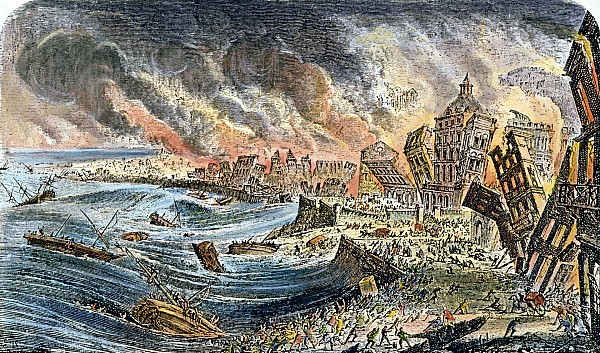
Are you then sure, the power which would create
The universe and fix the laws of fate,
Could not have found for man a proper place,
But earthquakes must destroy the human race?”
Voltaire (1755)
http://hudsonvalleygeologist.blogspot.com/2012/03/philosophy-literature-religion-and.html
Voltaire's "Candide" was written in response to The Great Lisbon Earthquake.
http://en.wikipedia.org/wiki/Candide
Voltaire's "Candide" was written in response to The Great Lisbon Earthquake.
http://en.wikipedia.org/wiki/Candide
***
"Historical Depictions Of The Great Lisbon Earthquake"
Cal, Berkeley's National Information Service For Earthquake Engineering
http://nisee.berkeley.edu/lisbon/
***
"The 1755 Lisbon Earthquake"
A blog post notable for its "Comments."
http://blog.catherinedelors.com/the-1755-lisbon-earthquake/
***
***
"The 1755 Lisbon Earthquake"
A blog post notable for its "Comments."
http://blog.catherinedelors.com/the-1755-lisbon-earthquake/
***
A Christian Believer's Response To The Great Lisbon Earthquake
***
The Lisbon Earthquake Viewed By An Apostate Liberal
Theodicy: How Do We Account For The Existence Of Evil?
(... especially evil that cannot be "blamed" on anyone).
***
Wikipedia's "1755 Lisbon Earthquake
Effect on society and philosophy
The earthquake had wide-ranging effects on the lives of the populace and intelligentsia. The earthquake had struck on an important church holiday and had destroyed almost every important church in the city, causing anxiety and confusion amongst the citizens of a staunch and devout Roman Catholic city and country, which had been a major patron of the Church. Theologians focused and speculated on the religious cause and message, seeing the earthquake as a manifestation of divine judgment.[17] Most philosophers rejected that on the grounds that the Alfama, Lisbon's red-light district, suffered only minor damage.
The earthquake and its fallout strongly influenced the intelligentsia of the European Age of Enlightenment. The noted writer-philosopher Voltaire used the earthquake in Candide and in his Poème sur le désastre de Lisbonne ("Poem on the Lisbon disaster"). Voltaire's Candide attacks the notion that all is for the best in this, "the best of all possible worlds", a world closely supervised by a benevolent deity. The Lisbon disaster provided a counterexample. As Theodor Adorno wrote, "[t]he earthquake of Lisbon sufficed to cure Voltaire of the theodicy of Leibniz" (Negative Dialectics 361). In the later twentieth century, following Adorno, the 1755 earthquake has sometimes been compared to the Holocaust as a catastrophe that transformed European culture and philosophy. Jean-Jacques Rousseau was also influenced by the devastation following the earthquake, whose severity he believed was due to too many people living within the close quarters of the city. Rousseau used the earthquake as an argument against cities as part of his desire for a more naturalistic way of life.[18]
The concept of the sublime, though it existed before 1755, was developed in philosophy and elevated to greater importance by Immanuel Kant, in part as a result of his attempts to comprehend the enormity of the Lisbon quake and tsunami. Kant published three separate texts on the Lisbon earthquake. The young Kant, fascinated with the earthquake, collected all the information available to him in news pamphlets, and used it to formulate a theory of the causes of earthquakes. Kant's theory, which involved the shifting of huge subterranean caverns filled with hot gases, was (though ultimately shown to be incorrect) one of the first systematic modern attempts to explain earthquakes by positing natural, rather than supernatural, causes. According to Walter Benjamin, Kant's slim early book on the earthquake "probably represents the beginnings of scientific geography in Germany. And certainly the beginnings of seismology."
Werner Hamacher has claimed that the earthquake's consequences extended into the vocabulary of philosophy, making the common metaphor of firm "grounding" for philosophers' arguments shaky and uncertain: "Under the impression exerted by the Lisbon earthquake, which touched the European mind in one [of] its more sensitive epochs, the metaphor of ground and tremor completely lost their apparent innocence; they were no longer merely figures of speech" (263). Hamacher claims that the foundational certainty of Descartes' philosophy began to shake following the Lisbon earthquake.
The earthquake had a major impact on Portuguese politics. The prime minister was the favorite of the king, but the aristocracy despised him as an upstart son of a country squire (although Prime Minister Sebastião de Melo is known today as Marquis of Pombal, the title was only granted in 1770, fifteen years after the earthquake). The prime minister in turn disliked the old nobles, whom he considered corrupt and incapable of practical action. Before 1 November 1755 there was a constant struggle for power and royal favor, but the competent response of the Marquis of Pombal effectively severed the power of the old aristocratic factions. However, silent opposition and resentment of King Joseph I began to rise, which would culminate with the attempted assassination of the king, and the subsequent elimination of the powerful Duke of Aveiro and the Távora family.
No comments:
Post a Comment